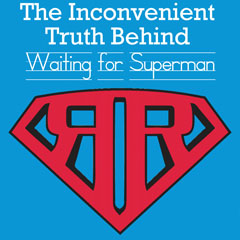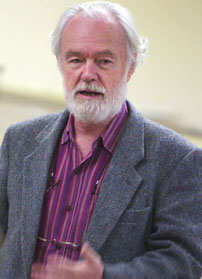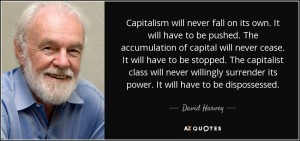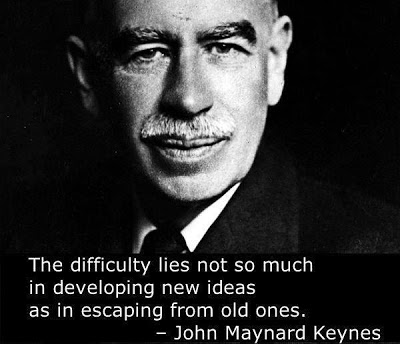Tony Santos, a blogger who pretends to know something about economic theory, has come out with an over-wrought and under-thought rant about Keynesian economics that is frankly embarrassing. There is also something profoundly ironic about a libertarian socialist like myself writing a defense of Keynesian economics, the political economy seen as a grand bargain between the democratic upsurge among the masses after World War II and big capital, but such is the under-education of the proletariat.
The fact is that, despite their pleas, the Right wing opponents of Keynesian economics are in something of a quagmire. On the one hand, they hold up as a golden era the presidency of Dwight Eisenhower and those years when America was most prosperous. On the other hand, they try to repudiate the economic program of Eisenhower, a Keynesian wonderland where projects like the interstate highway system and other public works put the working class into good-paying, unionized jobs that created disposable income they in turn could inject into the economy.
The basic logic of Keynes, which has proven itself correct multiple times in the living memory of the Baby Boomers, is that when you are in a recession, you engage in huge levels of deficit spending. This can include the aforementioned public works programs but includes other things, such as raising the monthly pension payments to retirees. (Of course, Gina Raimondo has figured out a way to warp that process by turning the payments into a stipend for Wall Street, but that is another story.)
Why exactly did Keynesian economics fall into disrepute? That is an interesting story that I like to call World War II and the Cold War.
The Great Depression turned the country into a wasteland, a place where the radical Left and Right saw a huge growth in membership because of the public despair. Roosevelt, who had no idea what he was actually doing, responded to popular protests by Socialists and Communists by creating the New Deal programs like unemployment insurance, social security, public arts programs, and infrastructure improvement efforts. Right wingers like Mr. Santos might see this as indicative of FDR’s closeted Communism but, in reality, it was his effort to prevent a popular revolution that could have resulted in either the fragmenting of the country into several smaller republics or a second civil war.
One notable effort taken up by then-Agriculture Secretary Henry Wallace involved pork and cotton. The challenge facing farmers was an over-abundance of supply in the face of a lack of demand. As a response, Wallace paid farmers to plow under their crops and slaughter millions of piglets, which he in turn had them convert into meat products, cooking lard, and soap that was distributed for free to the poor. As a result, the farming sector saw a return to prosperity in several years while Wallace went on to replace Jack Garner as Roosevelt’s Vice President.
However, Roosevelt had no clue what he was doing. Once he began to see the returns from his New Deal programs, he acceded to the agitation of Right wingers like Herbert Hoover and cut spending on his programs. Almost overnight, the economy plummeted and the country went into what was called the Roosevelt Recession.
Why?
In simple language, FDR failed to recognize that one must deficit spend for a long period, measured in decades rather than fiscal quarters, to create a sustainable recovery. Combined with a progressive tax code that makes the multi-millionaire mansion owners pay a hefty tax on their income, the economy is injected with capital that pushes it out of the slump. The workers, including, I suspect, people like Mr. Santos, prosper while the rich are able to stay rich but not afford that second bone spoon for their caviar.
When the Roosevelt Recession hit in 1937, the shock was so immediate that the President actually thought it was a Wall Street conspiracy and the newspapers were lying. Of course, within the next two years, this funny thing called the invasion of Poland happened. When Britain and France declared war on Germany, the United States found itself providing arms, munitions, and materiel to the Allies while still technically not participating in the war. The Lend-Lease Program and others like it created jobs in munitions factories that helped boost the recovery. Combined with more Keynesian programs, the economy began to recover.
Within two years, America entered the war and the entire country was either in the military or at work in the factories. America was back on its feet because we were the only country whose civilian population was not being pummeled by German bombs and Japanese kamikazes.
Then something entirely unexpected happened. At the 1944 Democratic Party convention, the Southern Democrats instituted a minor coup by replacing Wallace on the Democratic Party ticket with a haberdasher named Harry Truman, a man who was totally out of his league in every sense. Whereas Wallace was interested in a post-war peace with our wartime Soviet allies, Truman, a rabid anti-Communist, wanted to use the atomic bombs as a warning to Stalin.
As the wartime alliance fell apart, Truman began a Cold War that had some very hot zones in Korea, Vietnam, and various parts of Africa and South America over the next 45 years. These never-ending confrontations with the dread beast Communism became what Noam Chomsky once described as our primary engine of Keynesian growth.
So why did the Keynesian economics fail and neoliberalism come into popularity?
In 1968, America elected a career sociopath named Richard Nixon. As his Presidency shambled along, he responded, much like Roosevelt, to popular protests and ended the Vietnam War by making peace with China and Russia. This turned off the Keynesian engine, causing wages to stagnate and the dollar to inflate. To stave off the harm, he introduced wage and price controls while taking the dollar off the gold standard. This sent his Right wing backers into a fury, meaning they refused to defend him when that pesky Watergate thing showed the man was actually a raving psychopathic monster.
The decade after Nixon, culminating with the Reagan administration, was actually a series of American-triggered minor wars with the Soviet bloc that generated more customers for the munitions factories. This was also the beginning of the neoliberal epoch, which generated quick cash by privatizing state-owned enterprises and deregulating trade to help the economy rebound.
By the time Clinton came to power, he figured out how to reduce the deficit to zero by instituting medieval cuts to Welfare and building up the prison-industrial complex with his “tough on crime” three strike laws and narcotic drug policies that overwhelmingly targeted the poor and people of color. For example, consider the massive sentencing disparity between conviction for crack rock and powder cocaine, a Kafkaesque farce where you face more jail time for possessing coke cut with baking soda!
Another way Clinton generated quick cash to make it seem like we were in prosperous times was by deregulating the stock market, which turned it into a cyclical bubble-generator made up of exceedingly more dangerous booms and busts. The first of these was the savings and loan swindle, another was the dot-coms going dot-bust, and the most recent was the housing robbery that caused the 2008 collapse and near-apocalypse.
In the end, Keynesian economics does have its flaws. For example, it does have the tendency to breed corruption, but in a state where the mob and legislature are hard to distinguish, that speaks to the need for a strong ethics bill and prosecution for malfeasance under the RICO act, not against Keynes. Another problem is that it is not critical by design of economic or military imperialism, as is the case with the NATO countries that have remained on the Keynesian program.
The bottom line is that Tony Santos is writing something that is true but which speaks against his own class interests. The reason America never had a huge Communist movement after the Red Scare and McCarthyism stems in part from the fact that Keynesian economics generated a myth of “American exceptionalism” that says somehow we have a certain level of class mobility, that the American dream is real and we can all be millionaires. The candidacy of Bernie Sanders, at the least, has demonstrated a populist upsurge wherein a large portion of the population not only sees socialism as favorable but wants it. Yet the converse of this is the Right wing upsurge around someone like Donald Trump. That means we are talking about violence and people getting hurt.
Personally I am all in favor for the collapse of capitalism and the rise of a proletarian revolution that puts bankers in jail. The Right wing knows this sentiment exists in many people, that is why they now are also condemnatory of Wall Street and “crony capitalism”. But I am unsure if Mr. Santos is as well.
If there are issues within the grants that fund the project or other things of that nature, fine, I am all for close scrutiny of a construction project funding mechanism. But I am equally opposed to just allowing the roads and bridges rot while Rhode Island makes itself more unattractive to businesses. The money that trucking companies have to pay is a fraction of their costs for repairing damaged vehicles. And to be perfectly clear, there were Teamsters to be found at the recent State House rally, so these protests sound like phony whining from the yacht owners of Rhode Island.





